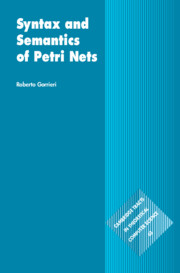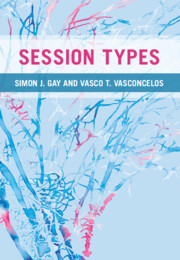Refine search
Actions for selected content:
1983 results in Distributed, Networked and Mobile Computing
A Science of Concurrent Programs
- Coming soon
-
- Expected online publication date:
- March 2026
- Print publication:
- 31 March 2026
-
- Book
- Export citation
5 - Other Equivalences for Petri Nets
-
- Book:
- Syntax and Semantics of Petri Nets
- Published online:
- 09 September 2025
- Print publication:
- 25 September 2025, pp 200-228
-
- Chapter
- Export citation
4 - Communicating Systems
-
- Book:
- Syntax and Semantics of Petri Nets
- Published online:
- 09 September 2025
- Print publication:
- 25 September 2025, pp 105-199
-
- Chapter
- Export citation
Glossary
-
- Book:
- Syntax and Semantics of Petri Nets
- Published online:
- 09 September 2025
- Print publication:
- 25 September 2025, pp 253-257
-
- Chapter
- Export citation
Preface
-
- Book:
- Syntax and Semantics of Petri Nets
- Published online:
- 09 September 2025
- Print publication:
- 25 September 2025, pp vii-vii
-
- Chapter
- Export citation
1 - Introduction
-
- Book:
- Syntax and Semantics of Petri Nets
- Published online:
- 09 September 2025
- Print publication:
- 25 September 2025, pp 1-10
-
- Chapter
- Export citation
6 - Conclusion
-
- Book:
- Syntax and Semantics of Petri Nets
- Published online:
- 09 September 2025
- Print publication:
- 25 September 2025, pp 229-234
-
- Chapter
- Export citation
References
-
- Book:
- Syntax and Semantics of Petri Nets
- Published online:
- 09 September 2025
- Print publication:
- 25 September 2025, pp 258-265
-
- Chapter
- Export citation
3 - Non-communicating Parallel Systems
-
- Book:
- Syntax and Semantics of Petri Nets
- Published online:
- 09 September 2025
- Print publication:
- 25 September 2025, pp 58-104
-
- Chapter
- Export citation
Appendix - Solutions to Selected Exercises
-
- Book:
- Syntax and Semantics of Petri Nets
- Published online:
- 09 September 2025
- Print publication:
- 25 September 2025, pp 235-252
-
- Chapter
- Export citation
Index
-
- Book:
- Syntax and Semantics of Petri Nets
- Published online:
- 09 September 2025
- Print publication:
- 25 September 2025, pp 266-270
-
- Chapter
- Export citation
2 - Sequential Systems
-
- Book:
- Syntax and Semantics of Petri Nets
- Published online:
- 09 September 2025
- Print publication:
- 25 September 2025, pp 11-57
-
- Chapter
- Export citation
Contents
-
- Book:
- Syntax and Semantics of Petri Nets
- Published online:
- 09 September 2025
- Print publication:
- 25 September 2025, pp v-vi
-
- Chapter
- Export citation
Frontmatter
-
- Book:
- Syntax and Semantics of Petri Nets
- Published online:
- 09 September 2025
- Print publication:
- 25 September 2025, pp i-iv
-
- Chapter
- Export citation
Acknowledgments
-
- Book:
- Syntax and Semantics of Petri Nets
- Published online:
- 09 September 2025
- Print publication:
- 25 September 2025, pp viii-x
-
- Chapter
- Export citation

Syntax and Semantics of Petri Nets
-
- Published online:
- 09 September 2025
- Print publication:
- 25 September 2025

Session Types
-
- Published online:
- 12 June 2025
- Print publication:
- 27 March 2025

The Pi-Calculus
- A Theory of Mobile Processes
-
- Published online:
- 29 May 2025
- Print publication:
- 19 July 2001
Contents
-
- Book:
- Session Types
- Published online:
- 12 June 2025
- Print publication:
- 27 March 2025, pp v-viii
-
- Chapter
- Export citation
9 - Propositions as Sessions
-
- Book:
- Session Types
- Published online:
- 12 June 2025
- Print publication:
- 27 March 2025, pp 197-226
-
- Chapter
- Export citation
